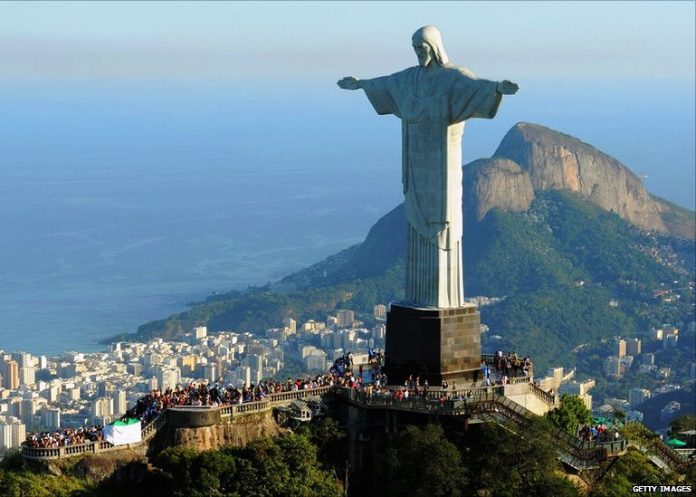For we wrestle not against flesh and blood, but against principalities, against powers, against the rulers of the darkness of this world, against spiritual wickedness in high places. Ephesians 6: 12
This is the latest chapter in a movement that began in France three centuries ago with Voltaire and the Enlightenment and its seductive philosophy of secular ethics and relativism. Decades later the movement promised Liberté, égalité, fraternité as tens of thousands of heads fell under the guillotine and the Goddess of Reason was installed in Notre Dame Cathedral in Paris.
As such, the French Revolution was the first major event in a movement whose real motive and goal was and continues to be the dethronement of Christ the King and the ultimate eradication of Christendom and all memory of Jesus Christ and the Cross of Salvation.
Since then, this movement has continued its march through history under a number of names – socialism, communism, Marxism and of lesser intensities such as progressivism and liberalism –contaminating cultures and whole nations through the absorption of poisonous antihuman ideologies. These multiple ideologies, which are mere tentacles of a single diabolical host, have in turn insinuated into the world through governments, academia, media and a panoply of NGOs (non-governmental organizations) promising a palate of humanist ‘good works’ designed to destroy the human soul while promising an increasingly virtuous, even Utopian, world.
One of the targets is Brazil.
Portugal’s Progeny
Once a colony of the Portuguese Empire from the 16th to the early 19th century, Brazil declared its independence from Portugal in 1822 and became the Empire of Brazil until a coup in 1889 established it as the First Brazilian Republic which has seen two periods of dictatorship: the first during the Vargas Era (1937–1945) and the second under the Brazilian military government (1964–1985).
Until recently, Catholicism has been dominant, though change during the past century has led to a simultaneous growth in secularism. Equally dramatic has been the sudden rise of evangelical Protestantism to over 22% of the population. The 2010 census also indicated that fewer than 65% of Brazilians consider themselves Catholic, down from 90% in 1970 – a decline associated with falling birth rates to one of Latin America’s lowest at 1.83 children per woman, well below replacement levels, prompting Cardinal Claudio Hummes to comment: “We wonder with anxiety: how long will Brazil remain a Catholic country?”
And throughout the past century, Brazil has continued to be bedevilled by socialism which has a stronghold in its northeast and reared its head once again during this election season as Brazil struggles for the very soul of this once primarily Catholic nation of 200+ million.
The general election was held October 2 to determine whether Brazil’s presidency would return to Jair Bolsonaro or to his contestant – Luiz Inácio Lula da Silva, his socialist rival.
Candidates’ History
But first a little history of the two candidates.
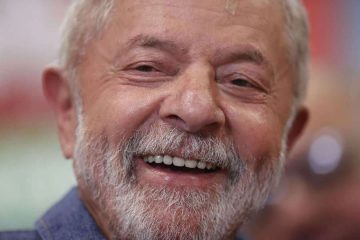 A charismatic politician, Lula has long been a powerhouse of the American left. Born in Pernambuco state in the northeast, his parents were poor farmers who, with their eight children, moved to São Paulo state in search of a better life when Lula was 7. In his early 20s, he became a trade-union activist, worked as a union leader and eventually became president of the powerful union of metal workers in 1975, organizing several strikes challenging Brazil’s dictatorial government and cementing his image as a symbol of the workers’ movement.
A charismatic politician, Lula has long been a powerhouse of the American left. Born in Pernambuco state in the northeast, his parents were poor farmers who, with their eight children, moved to São Paulo state in search of a better life when Lula was 7. In his early 20s, he became a trade-union activist, worked as a union leader and eventually became president of the powerful union of metal workers in 1975, organizing several strikes challenging Brazil’s dictatorial government and cementing his image as a symbol of the workers’ movement.
In 1980, in response to Brazil’s then military regime, Lula and a group of workers, intellectuals and artists founded the Workers’ Party (PT), a left-wing party that brought together trade unionists, intellectuals, artists and liberation theology practitioners.
Lula was elected president in 2002 after three attempts, becoming part of Latin America’s pink tide, remembered for its massive social welfare programs. In 2010, having served two terms and forbidden by the Brazilian Constitution from standing again, he was replaced by PT candidate Dilma Rousseff who assumed office on January 1, 2011 as the country’s first female president.
Eight years later, Lula was jailed for corruption as part of the “Operation Car Wash” (‘Lava Jato’) investigation led by Judge Sergio Moro, which looked into a kickbacks scheme involving Brazil’s state oil company Petrobras which had ramifications across Latin America. During his time in prison, however, Brazil’s Supreme Court ruled that inmates cannot be jailed if their appeals are still pending, leading to Lula’s release in November 2019 after spending 580 days in prison.
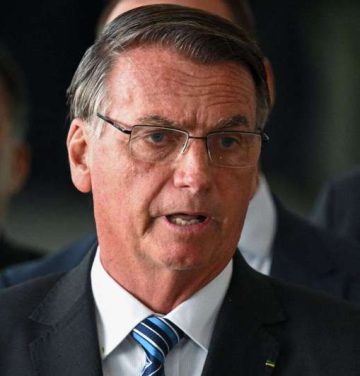 Jair Bolsonaro is Brazil’s first conservative president in four elections and now well known for his culture-warrior style of leadership after winning a dramatic victory in October 2018 following decades of liberal leaders running the world’s fifth-largest nation, home to one-third of Latin America’s population.
Jair Bolsonaro is Brazil’s first conservative president in four elections and now well known for his culture-warrior style of leadership after winning a dramatic victory in October 2018 following decades of liberal leaders running the world’s fifth-largest nation, home to one-third of Latin America’s population.
But his bid was threatened from the start by an assassination attempt in September 2018 where he was stabbed multiple times in the abdomen during a campaign rally, leaving him clinging to life. His attacker, Bispo de Oliveira, a former member of the Socialism and Liberty Party (PSOL), told police he had been “commanded by God” to kill Bolsonaro who now suffers life-long health problems requiring periodic hospitalizations. In 2019, his attacker was acquitted after a judge ruled him mentally ill.
attempt in September 2018 where he was stabbed multiple times in the abdomen during a campaign rally, leaving him clinging to life. His attacker, Bispo de Oliveira, a former member of the Socialism and Liberty Party (PSOL), told police he had been “commanded by God” to kill Bolsonaro who now suffers life-long health problems requiring periodic hospitalizations. In 2019, his attacker was acquitted after a judge ruled him mentally ill.
Yet Bolsonaro, a former army captain, was not deterred. He rose to power in October 2018 on a platform of confronting what he saw as a swelling socialist ideology, rooting out rampant corruption, cracking down on crime, reviving Brazil’s sluggish economy and disrupting sixteen years of continuous left-wing rule by the Worker’s Party (PT).
After joining the reserve army in 1988, Bolsonaro was elected to the lower chamber of Congress and subsequently reelected six times, before taking the office of president.
My country was very close to socialism, which led us to a situation of widespread corruption, serious economic recession, high crime rates and continuous ceaseless attacks against family and religious values that are part and parcel of our traditions,” Bolsonaro told the United Nations in New York City in September 2019.
He has also expressed support for former U.S. president Donald Trump and his policies, with a particular focus on the open southern border issue Trump attempted to solve with an extensive border wall and which current president Joe Biden has since opened wide to all comers, including drug cartels and traffickers.
Like Trump, Bolsonaro has also been critical of the Paris Climate Accord and has pushed to roll back environmental regulations. And to fight crime, he’s called for loosening gun laws and bringing back the death penalty.
Thus Bolsonaro has made his policies his primary focus and his evangelicalism central to his leadership. In a national address just before Christmas 2019, Bolsonaro said he took over Brazil in a deep ethical, moral and economic crisis. “The government has changed. Today we have a president who cherishes families, respects the will of its people, honours its military and believes in God,” he said.
His cabinet has also adopted an abstinence campaign to address the nation’s high teenage pregnancy rate and rising number of HIV infections. And he’s drawn controversy for expressing concerns that his country would become a “gay tourism paradise.” His economic policies are proving popular with Brazilians too, as he has pushed to lower taxes and privatize state companies.
Bolsonaro and the Consecrations
No surprise then that this populist Brazilian president would find himself in the crosshairs of the international media and Washington’s leftist cabal.
Particularly in light of his consecrations of Brazil to Our Lady.
On October 27th of this year, Bolsonaro announced he had made an act of consecration of Brazil to Our Lady three days earlier – the feast of St.Raphael – asking priests in Brazil to imitate him in saying the consecration prayer he published October 24 on Instagram: “I share with the Catholic priests of Brazil that today, in the Chapel of the Alvorada Palace, I made the following consecration prayer,” he said. “Queen of Heaven and Earth, as the Head of the Brazilian Nation, I renew that request that the Redeemer Princess Isabel once made to you: may you be the Supreme Ruler of this country, if Brazil is yours, and BY THIS ACT I COMMAND IT, it will be a nation whose God is the Lord, because you are entirely of God.”
Bolsonaro also invited priests to use the prayer.
Nor was this the first time the 67-year-old Bolsonaro participated in such an act of devotion, consecrating Brazil to Mary.
In 2019, he participated in a ceremony at the presidential palace, following national deputy Eros Biondini and Brazil’s Catholic Parliamentary Front asking for divine protection. Performed in reparation for sin and involving praying the rosary and singing Marian Hymns, this was followed by a proclamation of national consecration signed by President Bolsonaro, cabinet ministers Floriano Peixoto and Biondini. Other signatories included Bishop Areas and Bishop emeritus João Evangelista Martins Terra of Brasilia. Six months later, Rio de Janeiro’s archbishop, Cardinal Orani João Tempesta, followed suit – May 13, 2020 – by consecrating Brazil to the Immaculate Heart of Mary.
In the Crosshairs
This has been noticed. Just as Bolosonaro has been noticed around the world for his rejection of various global policies against life, family and freedom, for his refusal of a COVID-19 injection, and for his firm opposition to vaccine passports on the basis they might lead to ‘population control’. So it was also entirely predictable that Washington’s response has been akin to having a Cross held up in Transylvania.
Nor were Brazilians surprised when, a week after the October 2 election, a Catholic church in the town of São Mateus do Sul in southern Brazil was desecrated and all 28 statues of its saints destroyed.
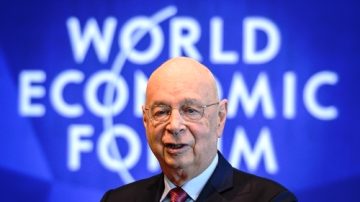 Or that, in May, Klaus Schwab of the World Economic Forum (WEF) threatened their president for refusing to sign the World Health Organization’s Pandemic Treaty. “Let’s also be clear,” Schwab said in a video posted on Twitter. “The future is not just happening. The future is built by us, a powerful community – you, here in this room. We have the means to impose this state (of the future) on the world.”
Or that, in May, Klaus Schwab of the World Economic Forum (WEF) threatened their president for refusing to sign the World Health Organization’s Pandemic Treaty. “Let’s also be clear,” Schwab said in a video posted on Twitter. “The future is not just happening. The future is built by us, a powerful community – you, here in this room. We have the means to impose this state (of the future) on the world.”
The German globalist’s message came amid remarks made May 15th by Bolsonaro, voicing Brazil’s explicit refusal to sign the WHO’s treaty, granting the global health body overarching powers in the guise of addressing public health issues. “Brazil is autonomous and will not get into this, you can forget that,” Bolsonaro said. “I’ve already (spoken) to our foreign relations cabinet and if that proposal goes forward, it won’t be with Brazil. Moreover, I was the only statesman that didn’t adhere to the lockdown policies. I said we had to take care of the elderly and people with comorbidities, and today’s studies outside of Brazil especially show that I was right.”
Citing the Brazilian state of Sao Paulo as an example of the utter failure of lockdowns to curb the Covid-19 virus, Bolsonaro said: “Check this out: Which state in Brazil locked itself the most? Sao Paulo. Which state had the most deaths per 100,000 people? Sao Paulo. That’s a sign I was right.”
No surprise either that in Bolsonaro’s moral climate, Brazilians are well aware of the possible Venezuelan-style socialist future they may be facing if Bolsonaro’s assessments of his country and the threats to it are accurate. That is, if Lula prevails and becomes president on January 1, 2023, as now appears likely.
Election Controversy
The first round of the election on October 2 resulted in Lula, the pro-abortion candidate, taking 48% of the vote, Bolsonaro 43% – neither receiving the required 50%. Yet the first round also underestimated Bolsonaro’s popularity, forcing Lula to build a broad coalition and move to the center. Which means he will face challenges in Congress, where Bolsonaro’s party made important gains.
The second round run-off results were even tighter. Held October 30, Lula won again – receiving 50.89 %, defeating the incumbent who had 49.11% … despite Bolsonaro’s huge popularity throughout most of Brazil, except in the northeast corner.
Nor was it any surprise that the tightness of the race itself generated major controversy – some based on Lula’s leftist and criminal history, some based on the open admission by the American Central Intelligence Agency (CIA) of what is now being viewed as subtle but direct election interference.
Team Biden intervenes
According to Foreign Policy Magazine, over the past year U.S. President Joe Biden has deployed top administration officials to meet with their Brazilian counterparts to convey a simple message to President Bolsonaro: Don’t derail Brazil’s democracy! It’s a message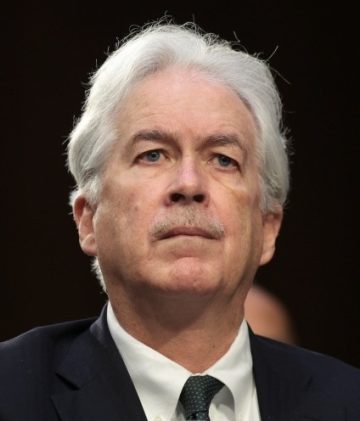 regarded by many political sophisticates as code from top officials from the White House, the Defense and State Departments and even CIA director William Burns who, during an unannounced visit to Brasilia in June, told Bolsonaro he should stop casting doubt on his country’s voting system by talking about voting fraud ahead of the October election, potentially ‘subverting’ the presidential elections and frustrating Team Biden’s political will that Bolsonaro, the pro-Christian populist, be replaced by Lula, the radical leftist.
regarded by many political sophisticates as code from top officials from the White House, the Defense and State Departments and even CIA director William Burns who, during an unannounced visit to Brasilia in June, told Bolsonaro he should stop casting doubt on his country’s voting system by talking about voting fraud ahead of the October election, potentially ‘subverting’ the presidential elections and frustrating Team Biden’s political will that Bolsonaro, the pro-Christian populist, be replaced by Lula, the radical leftist.
“Burns was making it clear that elections were not an issue that they should mess with,” reported an FP source. It is also unusual for CIA directors to deliver political messages. Still, a month later, Burns’ warnings were reinforced when U.S. National Security Adviser Jake Sullivan visited Bolsonaro and raised similar concerns about his undermining trust in Brazil’s voting system.
So one must ask: Was the Biden team expecting Bolsonaro’s defeat?
Regardless, since the October 30th run-off, millions of Bolsonaro supporters have been repeatedly taking to the streets to protest the results they believe were deliberately engineered in Lula’s favour with the invisible support of Team Biden. Read: Stolen. Read: Rigged. Or should this read: Unduly influenced?
Polling Analysts opine
Meanwhile, Bolsonaro’s supporters have polling experts on their side. “What just happened in Brazil is ‘mathematically impossible,’” says international politico Matthew Tyrmand. “That was the same conclusion I came to November 4, 2020 here in America. I’ve been involved in over 111 federal elections. There’s never been one like the American election in 2020 or the Brazilian election in 2022. Voters don’t vote in those patterns and data has never been tabulated in these patterns. Mass uniformity in ballot returns is statistically improbable (read: impossible). Yet, it only occurs in elections where nationalist leaders (like both President Donald J. Trump and President Bolsonaro) were supposedly deposed? Give me a break!”
According to Tyrmand, an analysis by a group of international experts applying Newcomb-Benford’s Law presented their statistical findings on the Second Round of the Brazilian Elections of October 30, 2022. Their analysis suggests various inconsistencies in the voting tabulation in several regions across the country and in the second round analysis they observed more illogical numerical distributions than in the first round data. Even odder was that access to this data disappeared for an undisclosed period following the second election.
He concludes: “The data patterns outlined in the dossier contain many strong anomalies that are glaring red flags. This is especially the case in the northeastern region of the country. The curves and graphs in these compiled chart patterns present similarities to questionable elections in Iran and Venezuela in the past. This also greatly alarmed the expert source team.”
And so it goes …
Given the results of the 2020 U.S. election which Trump and tens of millions of his supporters regard as the biggest vote fraud in U.S. history – despite the media’s pathological denial – it’s not the least surprising that Bolsonaro has continued to question the trustworthiness of the Brazilian vote by claiming that Brazil’s electronic voting system has a history of fraud and that parts of the country’s independent judiciary favoured Lula in the race.
2020 & 2022 Races
Nor is Bolsonaro alone in wondering just how legitimate all this pressure really was.
“It is important that Brazilians have confidence in their electoral systems,” said a U.S. State Department official in a statement, adding that the United States is confident of Brazil’s institutions, including free, fair and transparent elections.
And presumably, the State Department is currently making similar statements amidst the din of voter fraud accusations rising perpendicularly across the U.S. following the November 8th mid-term elections where the long-expected Red Wave of winning Republican candidates failed to materialize. And where, a week after the election, votes continued to ‘slow walk’ in, almost invariably favouring Democrat candidates while Republican votes dropped incrementally by the day. Also reported is the latest statistic from Arizona’s Maricopa County indicating that despite an only 17% Democrat turnout on Election Day, Democrats were winning over 50% of the votes.
Another statistical impossibility?
Nothing to see here …
Yet according to various tortured media gyrations, there’s absolutely nothing to see here, folks!
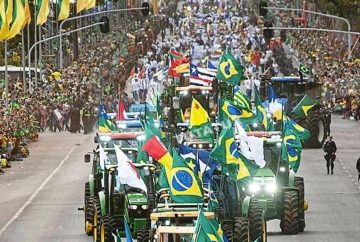 Nor, apparently, is there anything much to see in Brasilia two weeks after their second vote, all the massive demonstrations notwithstanding.
Nor, apparently, is there anything much to see in Brasilia two weeks after their second vote, all the massive demonstrations notwithstanding.
“This will be a stress test for Brazil’s democratic institutions and one that we have never had since Brazil transformed to democracy in the 1980s,” opined Pedro Abramovay, the Rio de Janeiro-based director of the Latin America program at the (Soros) Open Society Foundations and a former Brazilian justice ministry official during Lula’s presidency, from 2003 to 2010.
“Brazilian democracy since the late 1980s has just gone from strength to strength,” assured Michael McKinley, U.S. ambassador to Brazil from 2017 to 2018.
Will this ‘strength’ continue under Lula and his American friends? And will he be able to save the Amazon? Just asking ….
Also, will Brazilian voters continue to be punished because Bolsonaro stood up to radical Marxist forces, opposed coronavirus restrictions that made no sense, took on the fake news media funded by international subverters and consecrated the country to Mother Mary?
Marxist forces, opposed coronavirus restrictions that made no sense, took on the fake news media funded by international subverters and consecrated the country to Mother Mary?
Consecration Graces
Or might this be exactly what makes all the difference? That Brazil has been uniquely dedicated to Our Lady by her president? Twice.
Does this not hearken back to the apparitions of Our Lady of Fatima who told the three children she appeared to in 1917 that unless Russia was consecrated exclusively to her Immaculate Heart, Russia’s errors – communism and all its ideologies and ‘isms’ – would continue to disseminate through the entire world?
The Mother of God also cautioned that if Her requests were not granted, “Russia will spread its errors throughout the world, raising up wars and persecutions of the Church. The good will be martyred, the Holy Father will have much to suffer and various nations will be annihilated.”
This means that, without Russia’s proper consecration, no country would be spared as the world spirals into global socialism and communism. Yet isn’t this exactly what the elections and politics of 2020 and 2022 and Klaus Schwab are all about? All driven by the same international order and its totalitarian masters now undermining democracies everywhere in the name of saving them and the planet?
Will Brazil escape? Let us continue to pray our rosaries unceasingly for our own country and for the U.S. and for Brazil. And wait and watch.

